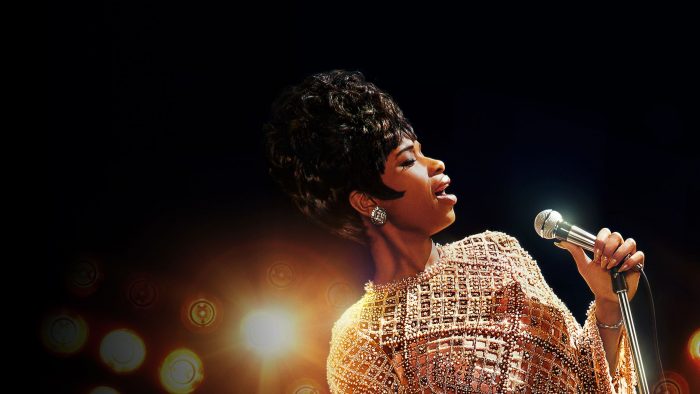Movie Review: Jennifer Hudson pays tribute to the Queen of Soul in ‘Respect’
Reviewed by Jeffrey Sanzel
Aretha Louise Franklin began her career as a child singing in her father’s Baptist Church. She would go on to be one of the most important and influential vocalists of all time. Beloved as a musician as well as civil rights activist, “the Queen of Soul” would touch millions.
Tony-Award nominated Liesl Tommy makes her featured film debut with Respect, a biopic of Franklin’s early life and rise to fame. Beginning in her Detroit home in 1952 and traveling forward twenty years, Tracey Scott Wilson’s screenplay is a mostly straightforward look at one of the most iconic figures of the music industry.
The film begins with ten-year-old Aretha (a marvelous Skye Dakota Turner) being woken by her father, Baptist minister C.L. Franklin (Forest Whitaker), to entertain his guests. The opening sequences show his pride in her vocal prowess and his manipulative nature, themes that will carry through their entire relationship. During one party, a friend of her father’s rapes the preadolescent Franklin. The film is a bit hazy about the rape and the birth of her first two children, sidestepping a murky part of Franklin’s past. (There have been multiple articles written about both the liberties and inaccuracies of Respect.)

The story continues with her breaking from her father’s supervision and connecting with Ted White (Marlon Wayans), who becomes her manager and husband. Unfortunately, White is abusive, with Franklin trading one controlling man for another. Along the way, she signs with Atlantic Records producer Jerry Wexler (Marc Maron), who becomes an impetus in her career shift.
One senses a list of items that the creators wanted to cover and checked them off as they went, manifesting in a mechanical progression. In addition, the dialogue often states the characters’ thoughts and feelings rather than revealing them in action. As a result, the subtext—the underlying humanity—is often lost as the plot moves forward.
Tommy and Wilson have managed to make recording fascinating and engaging. The breakthrough recording in Muscle Shoals, Alabama, runs the gamut from tense to exhilarating. Throughout, the scenes focusing on Franklin’s art and craft shine. Recreation of interviews is cleverly juxtaposed with the “reality” of the moment. But more could have—and should have—been made of her civil rights work.

Whitaker makes the most of Franklin’s father, but because Wilson has avoided many of the more unsavory aspects of C.L. Franklin (alluded to but unconfirmed), the character never feels fully realized. Marlon Wayans fairs a bit better, finding the edge and danger in White.
Marc Maron is a joy as Wexler, both caring and quirky. Kimberly Scott shines as the family matriarch. Audra McDonald makes the best of what is little more than a cameo as Franklin’s mother. Tituss Burgess embodies kindness as James Cleveland, a man who arcs through her entire life. Mary J. Blige brings the right blend of imperious ego and genuine no-nonsense to Dinah Washington (though her major scene is an incident most likely connected to Etta James).
At the center of the film is Jennifer Hudson, delivering a knockout performance. Hudson first encountered Franklin when she sang “Share Your Love With Me” in her American Idol audition. Then, following Hudson’s Academy Award win for Dreamgirls, Hudson visited Franklin in New York. According to Hudson, “… one of the first things she said to me was, ‘You’re gonna win another Oscar for playing me, right?’”.
Hudson brings warmth and intelligence to her Franklin, navigating the entire range of innocence and hope to the constant struggle with her inner demons. She allows the pain to swell and recede, some moments turning in and others lashing out. Her growth to stardom and the price that she paid remain in precarious balance. Hudson owns every song, honoring Franklin but bringing her own power to the interpretations. She celebrates the entire range of Franklin’s work, from the church music to early jazz standards to finally those that became her signature songs. Whether taking on the traditional “Ac-Cent-Tchu-Ate the Positive,” finding the depths in “I Never Loved a Man (The Way I Love You),” soaring with “Amazing Grace,” or exploding with “Respect,” Hudson delivers in the dozen-plus songs.
There is an odd misstep in the closing of the film. Franklin’s Kennedy Center Honors performance of “Natural Woman” is shown in its entirety, a spectacular reminder of Franklin’s unique, extraordinary presence. Hudson follows this singing “Here I Am (Singing My Way Home,” a new song composed for the film. This pleasant if unspectacular song highlights the exceptional Franklin songbook and comes across as a clumsy attempt for a Best Song Oscar nomination. It seems a step-down and superfluous.
Respect touches on many of the highs and lows of Aretha Franklin’s rise to fame. Franklin had a complicated life, and while Respect is sincere, Franklin deserved a more complex approach to telling her story. But, in the end, Jennifer Hudson’s star performance shines through.
Rated PG-13, Respect is now playing in local theaters.







